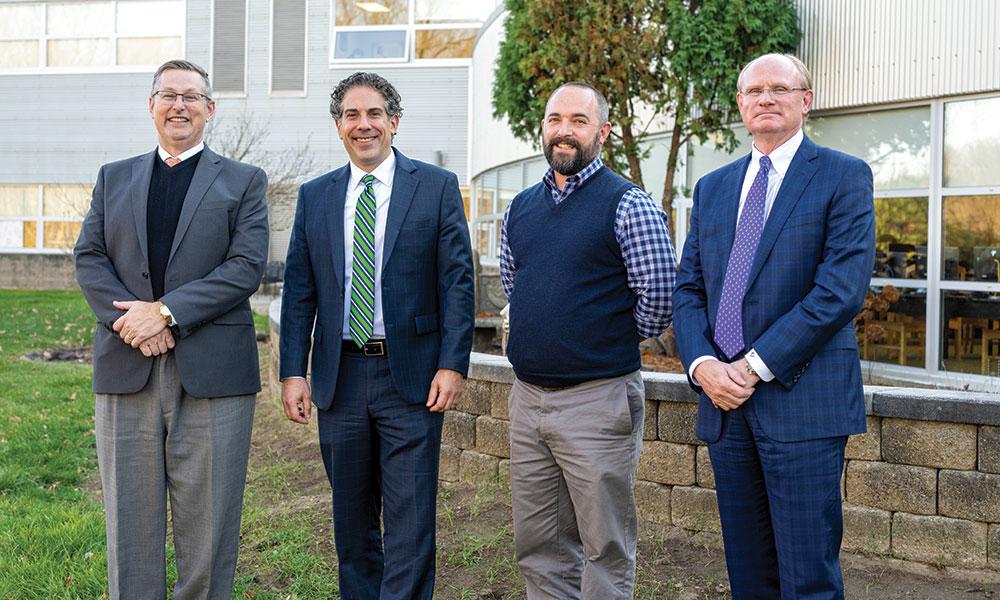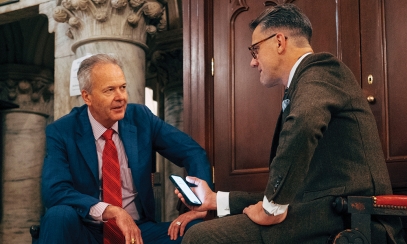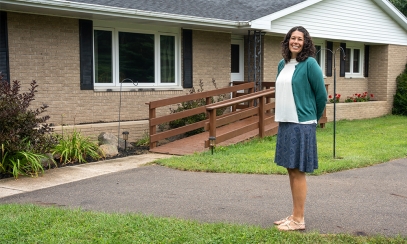
Presidents’ Day
They’re Uniquely Talented. Authentically Catholic. And Now, They’re Reinventing How Learning Happens Across the Diocese of Lansing
They’re Uniquely Talented. Authentically Catholic. And Now, They’re Reinventing How Learning Happens Across the Diocese of Lansing
This fall, the academic energy changed. Students, families and staff walking into any of the four Catholic high schools in our diocese felt the difference, and they knew to whom the credit belonged.
This fall, the academic energy changed. Students, families and staff walking into any of the four Catholic high schools in our diocese felt the difference, and they knew to whom the credit belonged.
The four school presidents now in place at Father Gabriel Richard (FGR), Lansing Catholic (LCHS), Lumen Christi (LC) and Powers Catholic (PC) have refreshed their organizations by pursuing new growth, stronger mission and a relentless emphasis on excellence.
And it shows. Catholic schools across the diocese recorded year-over-year enrollment growth for the first time in more than two decades, experiencing an 8 percent increase during the past two years.
“I think there's a lot of interest in what schools like ours have to offer,” said FGR President Joe Jordano. “I think there's a lot of frustration with the public schools, and sort of the rhetoric and the push towards ideology and beliefs that really don't resonate with a lot of people. The families who have come in have found it to be quite a breath of fresh air. Not only the academic rigor that we offer, but the way that our teachers and our faculty really care about our students.”
A closer look at enrollment increases
Across the U.S., Catholic schools are realizing new levels of growth. The National Catholic Educational Association reported that enrollment increased by nearly 4 percent in 2021-22, the first increase in 20 years and the largest increase ever recorded.
Here in the Diocese of Lansing, of course, enrollment growth is even stronger.
“We're getting students who have just started public high school, and they’re already coming in shadowing,” said Lansing Catholic President Dominic Iocco. “They describe their current high school experiences as ‘chaos.’ I think a lot of frustration has mounted these last couple of years, as parents come to feel like public schools haven't really been putting the student first.”
Powers Catholic President Timothy Gallic suggests the COVID-19 pandemic has opened many parents’ eyes when it comes to their children’s education.
“The pandemic allowed parents to see what their kids were actually learning. And they didn't like what they saw,” Gallic said. “Catholic schools were able to read the data correctly, and we found we could reopen our schools safely. Our students kept making progress while others were still learning remotely.”
Gallic also credits today’s enrollment trends to the Catholic tradition itself.
“Catholic schools are clearer about who they are and why they exist,” he said. “When you're living in a world that's full of confusion, somebody who can show you the way is someone you want to be with. And Catholic schools have a very clear sense of direction.”
What will it take to maintain these levels of growth? Lumen Christi President Tim DeWitt is very clear on this point.
“We need strong public schools because they're a part of our community. They are part of the infrastructure and what makes us a community in whole. But we also need strong Catholic schools as well. What’s more, I believe getting to the next level is all about being bold. We will never be apologetic for being authentically Catholic,” DeWitt said. “So when you come to us, we will teach the doctrines of the Church. We will teach the teachings of Jesus Christ. We will be loud.”
DeWitt believes people are ready, even eager, to receive brave messages of faith, led by strong Catholic educators.
Forming the whole student
“The key for a Catholic school is the formation of the whole person. We're not just here to teach you a series of subjects; we're here to teach a way of life,” Iocco said. “So that means we're concerned about your spiritual development, your intellectual development, your social development.”
Iocco says that formation has led to important changes at Lansing Catholic.
“Our students get a detention if they are found to have a cell phone with them in class,” he said. “It was a difficult change, but now our students actually engage in conversation, and we get a chance to make sure we're forming that whole person.”
At Lumen Christi, Tim DeWitt works to lead by example.
“It's important that they see me as I walk the halls, as I sit in a classroom, as I attend holy Mass,” he said. “I work to show a strong example of leading the life that I believe Christ is calling us to. I start every conversation with Christ at the center, and students will always see that first and foremost in me.”
All four of the school presidents across the diocese are careful to spend time in prayer, adoration and reflection each day. And they encourage their students and staff to do the same.
“At FGR, we’ve been doing what we call the one percent challenge. One percent of our day is 14 minutes and 24 seconds,” Jordano said. “And so we encourage everyone to spend that time before the Lord in the Blessed Sacrament. It's been really life-changing.”
Academics and mission
The academic bar in Catholic high schools is high and rising. With generally smaller class sizes and high achievement rates, the schools perform well.
“At Lumen Christi, our graduation rate is 99.9 percent. But, most importantly, 96 percent of our students are college-ready,” DeWitt said. “But that's not to say that we are purely college prep, because we must appeal to a vast array of different students. We do that through one-on-one teaching, through different programming and support services. We believe that we should be a Catholic school for all who come to us.”
Each of the Catholic school presidents is focused much more broadly than academics, however. Each institution has its own mission and purpose, but all agree that fostering well-educated, well-rounded servants of Christ is the most important thing of all. But when it comes to measuring success, Tim Gallic puts it quite simply.
“You know, there are a bunch of different ways you can measure the success of a school. You can measure it financially, you can measure it in enrollment, you can measure it in terms of the success of your graduates. But in my view, the only measure that counts is whether or not you're producing saints,” he said. “If you're producing saints, then you're succeeding. When I think of where Powers can go in the next bunch of years, I hope we'll see it's a school that's larger, that continues to grow until we're at capacity. I hope it’s a school that's filled with kids who are filled with the Holy Spirit, and who go out into the world and make a difference.”
At Lansing Catholic, Iocco encourages educators to stay the course toward a Catholic vision of education.
“What we saw for a long time in Catholic schools was a following of the public school model and pedagogy. That's when you also saw a lot of the decline in Catholic schools, because why would I have to pay tuition if I get the same thing at the public school for free,” he said. “We’ve woken up now, and we know we have to be different. What you're seeing in a lot of Catholic schools today is that reclaiming of the Catholic vision of education, which is fundamentally about that whole person and partnering with the family, to reinforce those values that the child has been brought up living at home. And it's that partnership, and that focus on the whole family and reinvigorating our understanding of Catholic education that's really starting to make the difference.”
The elephant in the room: Tuition costs
For many families, a major obstacle to choosing Catholic education is cost. Tuition is expensive, and for many parents it can seem insurmountable, particularly at the high school level.
Each of the four high school presidents working in the Diocese of Lansing, however, agree there are important solutions available to support students in need of financial aid.
“I always tell people that if you want to be here, for the right reasons, we'll find a way to make it work,” said FGR’s Jordano. “We are blessed with very generous donors who make Catholic education affordable for our families. Roughly 25 percent of the families in our school are on some form of tuition assistance. And our donors are very grateful, very generous and are very eager to provide the means necessary for the students to be able to attend FGR. We will find a way.”
At Lumen Christi, the conversation about tuition is a very open one.
“It is a reality,” DeWitt said. “Eventually you're going to have to talk about tuition. The math tells us that it costs us about $10,500 to educate a student. On average, we're collecting right around $6,000. So we have this gap to close, and we do it through fundraising, events, benefactors, endowment distributions, those types of things. It's a challenge. It's difficult. But I believe, as my mother would say, ‘God will provide.’ And he has.”
DeWitt believes there is a better model to be created and is already at work on doing it.
“We believe that there's a completely new tuition model out there that thinks about K through 12. And we've been working pretty hard on it,” he said. “A lot, a lot of work to do on it, but it's about helping a family go from the elementary to middle school levels without a huge jump, and from the middle to high school levels without another huge jump. We want to take those inflection points and kind of smooth that curve out.”
Powers Catholic President Timothy Gallic thinks a bit differently.
“I think the key is not to start with affordability. The key is to start with desirability,” he said. “If you want something, you will find the money for it. When I went to ask my wife to marry me, I had to buy her a ring. I could not afford the ring; I didn't have any money. But I really wanted to marry her. So, I found the money.”
Getting the word out
Gallic further believes there’s a strong need for Catholic schools to tell their stories.
“I believe that most students who go to public education have not looked at Catholic schools and rejected it. They've never even looked at Catholic schools. They don't know it exists,” he said. “Now, it seems hard to believe when you're in a Catholic school, and you're surrounded by the Catholic surroundings, and, you know, all the outreaches we do, how can people not know? And the fact is, they just don't. We have to find ways to get in front of people, and to help them to understand that there's a better option. And it's really an affordable option.”
At Lansing Catholic, Dominic Iocco agrees.
“I tell everybody I can,” he said. “Don't let finances stand in the way and we will find a way to make it work. And as a father of eight and with three students at the high school, I can attest that it is a sacrifice to send your students to a Catholic school. But it is worth every single penny.”
Joe Jordano
Father Gabriel Richard High School | Ann Arbor
Since his appointment in July 2021, Joe Jordano has been spearheading a return to purpose at Father Gabriel Richard. With a background in finance and marketing and experiences in the for-profit and nonprofit communities, both internationally and domestically, Joe blends his corporate, legal and mission experiences thoughtfully for the benefit of students.
He has a BS in economics from the Wharton School of the University of Pennsylvania. He and his wife, Becky, live in Plymouth with their three sons.
Dominic Iocco
Lansing Catholic High School | Lansing
As a nontraditional educator, Dominic Iocco brings clear business acumen, strong organizational skills and a relentless focus on mission to his role as Lansing Catholic High School president. Prior to joining Lansing Catholic in 2020, Dominic worked in media and business and held positions as professor and provost at John Paul the Great Catholic University. He’s led corporate turnarounds and has a keen sense for ensuring organizations — and people — deliver on the purposes for which they have been created.
Dominic holds degrees from Central Michigan University and the University of Phoenix. He and his wife have eight children and a small farm.
Tim DeWitt
Lumen Christi High School | Jackson
Using his extensive background with organizational leadership, strategic planning, financial analysis and treasury management, Tim DeWitt has been president at Lumen Christi since 2020. Previously, he served Albion College in various aspects as the chief financial officer, chief risk officer, chief investment officer, budget director and treasurer. Prior to his work in higher education, Tim served as a senior vice president for La Salle Bank and a financial planning and analysis manager for Borders Group, Inc.
Tim has a BS from Central Michigan University, where he majored in finance and economics. He also completed an advanced business program certificate at the Executive School of Management. He and his wife are Lumen Christi alumni, as are their two sons.
Timothy Gallic
Powers Catholic High School | Flint
With extensive experience in educational leadership, strategic planning and fundraising, Tim Gallic has served Catholic institutions across the United States. Most recently, he has been employed as a consultant working with Catholic schools to grow enrollment, stabilize budgets and train school staffs and boards. He joined the Powers Catholic family in September 2022.
Tim has a bachelor’s degree from Rutgers University and a master’s in school administration from the University of Scranton, Pennsylvania. He and his wife, Laura, have seven children.



